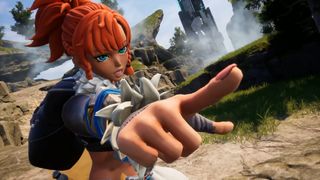Videogame patent lawyer says Nintendo is taking a risk with its Palworld lawsuit: 'They've exposed themselves in a big way'
"If you're too broad, then you've given them a pathway to make the patent go away."

When Nintendo announced its lawsuit against Palworld developer Pocketpair last week, it kicked off immediate conversations about how well Pocketpair could hope to fare in court. Despite Nintendo's last few years on the intellectual property warpath, IP lawyer and videogame patent expert Kirk Sigmon says its success in its Palworld lawsuit is far from guaranteed. In fact, Sigmon says that in suing Pocketpair, Nintendo risks losing its patent entirely.
In an interview with PC Gamer covering videogame patents and the Palworld lawsuit, Sigmon said that drafting a patent filing is a delicate balancing act, especially when it's a patent on a videogame design concept.
"Your job, to some degree, is to weave the delicate balance between going overly narrow—allowing everyone to freely knock off your idea because you've described it so narrowly—and going too broad," Sigmon said. "If you're too broad, then you've given them a pathway to make the patent go away, because you've given them an opportunity to prove that it was already in existence."
By Sigmon's estimation, some of the claims made by the patents widely assumed to form the basis of Nintendo's lawsuit skew too broad. "I mean, this part [of Nintendo's patent] is easy as hell to find: 'Control a player character in a virtual space based on operation input.' That alone I could throw any variety of videogame at," Sigmon said.
By basing a patent lawsuit on potentially overbroad claims, Sigmon explained, Nintendo's playing with fire. Both US and Japanese patent law have mechanisms for invalidating patents leveled against you. If Pocketpair is able to prove that the claims made by Nintendo's patents are demonstrated in prior art—meaning similar design elements had already existed in other games—then Nintendo wouldn't just lose its lawsuit. It could lose its patent entirely.
"Because this is drafted fairly broadly, even in Japanese, you can get clever about what games you're looking at as prior art, what references you're looking at," Sigmon said. "You'd be surprised how often you can make those arguments. They've exposed themselves in a big way."
The biggest gaming news, reviews and hardware deals
Keep up to date with the most important stories and the best deals, as picked by the PC Gamer team.
Lincoln started writing about games while convincing his college professors to accept his essays about procedural storytelling in Dwarf Fortress, eventually leveraging the brainworms from a youth spent in World of Warcraft to write for sites like Waypoint, Polygon, and Fanbyte. After three years freelancing for PC Gamer, he joined on as a full-time News Writer in 2024, bringing an expertise in Caves of Qud bird diplomacy, getting sons killed in Crusader Kings, and hitting dinosaurs with hammers in Monster Hunter.

Palworld developer reports Nintendo's suing over 3 Pokémon patents for only $66,000 in damages, but a videogame IP lawyer says fighting the lawsuit could mean 'burning millions of dollars'

No Man's Sky gets cross-save on a dozen platforms and brings back Mass Effect's Normandy as a limited-time rewar
Most Popular







